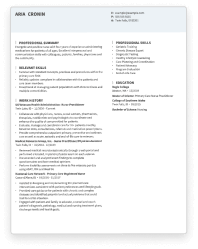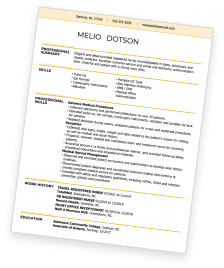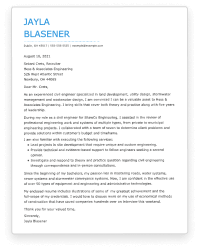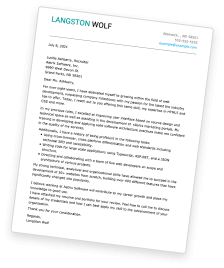Branch Manager Resumes: Overview
It is crucial that you write a great resume that clearly showcases your qualifications and achievements as a branch manager.
This is an important job. Overseeing day-to-day operations, managing a dedicated team, and ensuring exceptional customer service are just a few aspects of this multifaceted position.
Branch managers work in a variety of financial institutions, including:
- Large National Chains
- Local Banks
- Community-focused Banks
- Credit Unions
Discover how showcasing your unique qualifications can set you apart in the competitive world of banking.
For more help, explore our excellent resume examples and downloadable templates to build your own branch manager resume today!
Branch Manager Resume: Choose a Format
Before you start writing your resume, you need to choose a resume format. Selecting the right resume format to effectively present your skills and experience will help your resume stand out from the competition.
There are three resume formats that branch managers can consider: chronological, functional, and combination. We will discuss each in turn to help you decide which is best for your banking career.
Chronological Resumes for Branch Managers
Chronological resumes are the go-to for experienced branch managers. This format lets you showcase your career progression, emphasizing your achievements and contributions. It’s ideal for demonstrating steady growth and accomplishments in your managerial journey.
A chronological resume emphasizes your work history, listing each previous job in reverse chronological order.
Each job entry includes the job title, employer’s name and location, and the dates of employment. Then, under each job entry, responsibilities and accomplishments are detailed in concise bullet points.
A chronological format is also easily scanned by applicant tracking systems (ATS), making it an excellent choice for anyone seeking a branch manager position.
Functional Resumes for Branch Managers
A functional resume highlights key skills and accomplishments, emphasizing transferable skills and achievements. It can be a great choice for someone just starting their career or transitioning from a different industry.
For example, suppose you recently graduated from a four-year university, and your work history consists primarily of part-time jobs in various industries.
A functional resume is a great way to showcase the skills you learned in school and unrelated jobs that qualify you for the branch manager job.
While a functional resume can emphasize your skills and abilities, they are incompatible with most applicant tracking systems (ATS), so consider that possible drawback when choosing your resume format.
Combination Resumes for Branch Managers
Your third option is a combination resume. This format combines elements of chronological and functional resumes to put equal emphasis on your skills and experience.
This format is perfect for those with at least some relevant experience as a branch manager and relevant skills in bank management.
A combination format can work well if you have limited relevant work experience because it places the skills section above the work history section to showcase your ability to do the job even though you don’t have a lengthy work history.
Combination resumes are also an excellent choice for someone transitioning from a different industry. The format can help demonstrate your transferable skills and confirm your fit for the job.
Choosing a Resume Format
Choosing the right resume format to showcase your skills and experience is essential to the resume writing process.
If you are having trouble deciding the best format for your branch manager resume, we recommend using a chronological resume format.
Most career experts recommend the chronological format because it is familiar to most hiring managers and is highly compatible with applicant tracking systems (ATS).
Even if you don’t have relevant experience, you can tailor each section of your resume to highlight your transferable skills and qualifications.
For example, imagine you have experience in retail management or customer service. Although the experience may not be in a bank, they provide expertise in ensuring customer satisfaction, managing financial transactions, and other transferable skills.
How to Write a Branch Manager Resume
After you have selected a resume format, the next step is to outline your resume content. No matter the layout, your resume will include five essential sections:
- Contact Information
- Summary or Objective
- Work History
- Skills
- Education
Then, as space allows, you can include additional optional sections to make your resume stand out from the competition. But first, let’s look at these five critical sections for a branch manager resume.
Contact Information
First, you will list your contact information. Place this information at the top of your resume, and use an easy-to-read font. Make sure it stands out from the rest of the document so it is easy for hiring managers to find.
Your contact information section should include your full name, city and state of residence, phone number, and email address. Double-check this section to ensure your information is current and free of typos! After all, employers can’t call you for an interview if your phone number is incorrect.
You can also add a link to your LinkedIn profile if you like. However, be sure your profile picture and other information are professional and up-to-date.
Depending on the design of your resume template, the contact information section on a branch manager resume may look like this:
John Smith
Austin, Texas
john.smith@youremail.com
512-555-555
LinkedIn.com/in/john-smith
Summary or Objective
The next step to take when writing a branch manager’s resume is to craft a captivating summary or objective statement.
Place this section underneath your contact information, and write 2-3 brief sentences to introduce yourself to potential employers and entice them to read the rest of your resume.
A resume summary is best for an experienced branch manager. Summary statements provide an overview of your most relevant skills and experience.
An impressive summary statement might read:
“Dedicated banking professional extensively trained in bank leadership, fraud awareness and teller operations. Strategic thinker and tactical decision-maker with demonstrated success in leading teams and driving positive change.“
On the other hand, a resume objective is an excellent choice for someone new to the job or with limited experience.
Objective statements focus on expressing genuine interest in the position while highlighting relevant skills and qualifications.
A good objective statement for a branch manager resume might look like:
“Reliable problem-solver seeking a branch manager position to use leadership and customer service skills to drive growth for the company. Eager to apply my associate’s degree to grow my banking career with ABC Banking.”
Whether you write a summary statement or a resume objective, tailor this statement to each job you apply for. Use keywords from the job description to make your resume ATS-friendly and improve your chances of landing an interview.
Work History
Next, you will create your work history section. List your previous employers in reverse chronological order, starting with your most recent job and working backward. ‘
Each job entry will include the following information:
- Job Title
- Name of Employer
- Location (City and State)
- Dates of Employment
Then, under each job entry, you will write at least three bullet points detailing your most relevant job responsibilities, achievements and skills you learned.
Use strong action verbs to engage the reader, and quantify your accomplishments with numbers and percentages to demonstrate your impact in each job.
For example, a branch manager’s resume might include a job entry like this:
Assistant Branch Manager
Dotcom Mortgage Co. – Newtown, CT 02/2017 – 02/2020
- Identified and pursued community business opportunities through effective networking and community outreach.
- Responded to customer concerns, working with tellers to raise customer satisfaction ratings by 75%
- Coordinated schedules for 15 employees to ensure smooth daily operations.
Remember to tailor your bullet points to each job application to show your alignment with the job by including any qualifications or experience mentioned in the job description.
Skills
Next, create a dedicated skills section for your branch manager resume by showcasing skills like financial acumen, leadership, communication, and strategic planning to ensure your resume stands out.
Include both hard skills and soft skills to demonstrate your abilities and impress potential employers.
These skills should be tailored to the job description, but we have compiled the top five hard and soft skills for branch managers to give you some ideas:
Top 5 Hard Skills for Branch Manager Resumes
- Financial Analysis: An important technical skill, analyzing financial data for strategic decision-making is essential to your success in the banking industry.
- Risk Management: Effectively managing and mitigating financial risks is critical to a branch manager’s job.
- Business Development: Identifying and pursuing new business opportunities is vital to success in banking. This skill demonstrates your ability to create marketing plans and coordinate activities to attract new business and grow client relationships.
- Performance Management: Branch managers must be skilled in supervising and evaluating staff performance to ensure compliance with bank policies and customer satisfaction. Note that this may include computer skills through the use of performance management software.
- Customer Relationship Management: Successful branch managers are adept at building and maintaining solid client relationships.
Top 5 Soft Skills for Branch Manager Resumes
- Leadership: A successful branch manager must inspire and guide teams toward success. Your ability to hire, train and motivate employees will make you stand out from the competition.
- Communication: Clear and effective communication in both written and verbal forms is a sought-after skill for branch managers.
- Adaptability: Include this skill to demonstrate you can successfully navigate and lead through change.
- Decision-making: Branch managers must demonstrate sound judgment in critical situations and take decisive action to ensure smooth operations and customer satisfaction.
- Problem-solving: Identifying and resolving challenges to achieve positive outcomes is a highly valued skill for a branch manager job.
Your skills section is another opportunity to tailor your resume to the job you are applying for. Read each job description carefully and emphasize any of your skills mentioned in the job posting.
Your skills section can include an explanation of each skill listed like this:
- Risk Management: Proven track record in effectively managing and mitigating financial risks.
- Communication: Clear and effective communication in both written and verbal forms.
- Adaptability: Successfully navigating and leading through change.
- Decision-making: Sound judgment in critical situations.
Or, it can be a simplified list of skills like this:
- Written and Verbal Communication
- Problem-Solving
- Risk Management
- Business Development
- Client Relationship Management
Education
Next, include your educational background, emphasizing relevant degrees. You can also highlight any specific certifications or coursework that add value to your expertise as a branch manager.
Your education section should include your highest degree earned, the name of the school or university, and its location.
Optionally, you can add graduation dates, grade point average, or honors received.
An education section for a branch manager’s resume might look like:
Bachelor of Science: Accounting and Business Management
University of Colorado
Denver, Colorado
Additional Sections
If space allows, consider optional sections to enhance your resume.
You can include certifications, languages spoken, professional associations or volunteer work to showcase a well-rounded professional profile.
These additional sections provide a comprehensive view of your skills and interests that set you apart from other candidates.
These sections should be relevant to the branch manager position, so be thoughtful about what you include.
Top Certifications For Branch Managers
Boost your resume with industry-recognized certifications that enhance your credibility in the finance industry.
Earning certifications demonstrates your commitment to professional excellence and validates your knowledge of the job.
Some of the top certifications for a branch manager resume are:
- Certified Branch Manager (CBM): This certification ensures you have the essential business acumen and customer-centric competencies to drive revenue and efficiently serve your customers.
- Certified Bank Auditor (CBA): Becoming an accredited bank auditor demonstrates that you can objectively evaluate the quality and effectiveness of a bank’s internal controls, risk management, and governance processes to add credibility and reliability to financial reports.
- Certified Financial Marketing Professional (CFMP): The CFMP certification validates your mastery of data and analytics, revenue generation, leadership and strategy.
Tips For Writing A Branch Manager Resume
Tailor your resume for each application: Customize your resume to align with the specific requirements of the branch manager position. Addressing the particular needs of the employer will demonstrate you are genuinely interested in the branch manager position you are applying for.
Quantify achievements to showcase your impact: Use numbers and percentages to illustrate your contributions in previous job roles. For example, instead of saying, “Increased new customer accounts,” you might say, “Increased new customer accounts by 10% year over year.”
Keep your resume concise and focused: A branch manager’s resume should ideally be limited to one page. Focus on your most relevant skills and experience. Extending your resume to two pages is okay if you have an extensive work history.
Use action verbs to engage the reader: Engage the reader with strong action verbs like managed, implemented, increased, and coordinated to create impactful descriptions that convey a sense of accomplishment.
Incorporate keywords from the job description: Using keywords from the job posting will show your alignment with the job and help your resume be selected by applicant tracking systems (ATS).
Seek feedback: Ask a peer or mentor to review your resume for errors and to suggest areas for improvement. Getting feedback from a trusted colleague will ensure your resume is polished and effective.
Showcase a combination of hard and soft skills: To make your resume stand out in a competitive market, demonstrate your technical skills, such as knowledge of banking procedures and risk management and soft skills, like communication, team building and adaptability.
Helping Job Seekers Like You


Save Time With Our Resume Builder
Key Takeaways
- Tailor your branch manager resume for each job application, emphasizing your most relevant skills and experiences.
- Highlight hard and soft skills crucial for effective leadership in banking and finance to make your resume stand out.
- Include industry-specific certifications to enhance your credibility.
- Quantify achievements to showcase the value you bring to potential employers.
- Use keywords from the job description to make your branch manager resume more ATS-friendly.
Save Time With Our Cover Letter Builder












